Mental Health Assessment, Recovery, Models of Care - WSU
VerifiedAdded on 2022/12/23
|9
|2282
|72
Homework Assignment
AI Summary
This assignment analyzes a case study focusing on the mental health assessment of a patient named Munny Kaew, exploring the application of different models of care. The first question examines the importance of mental health examination in identifying symptoms and providing accurate diagnoses, discussing the components of a mental status examination, and referencing the DSM-5 criteria for depressive and trauma-related disorders. The second question applies the Stress-Vulnerability model to explain Munny's condition, identifying trauma and stress as key contributing factors. The assignment highlights the impact of life event stressors and job-related stress on the patient's mental state. The third question focuses on recovery-oriented practice, emphasizing the principles of respect, empowerment, and hope in promoting mental well-being. It discusses how these practices can be applied to Munny's case to foster his recovery, including building collaborative relationships, acknowledging his strengths, and providing support.
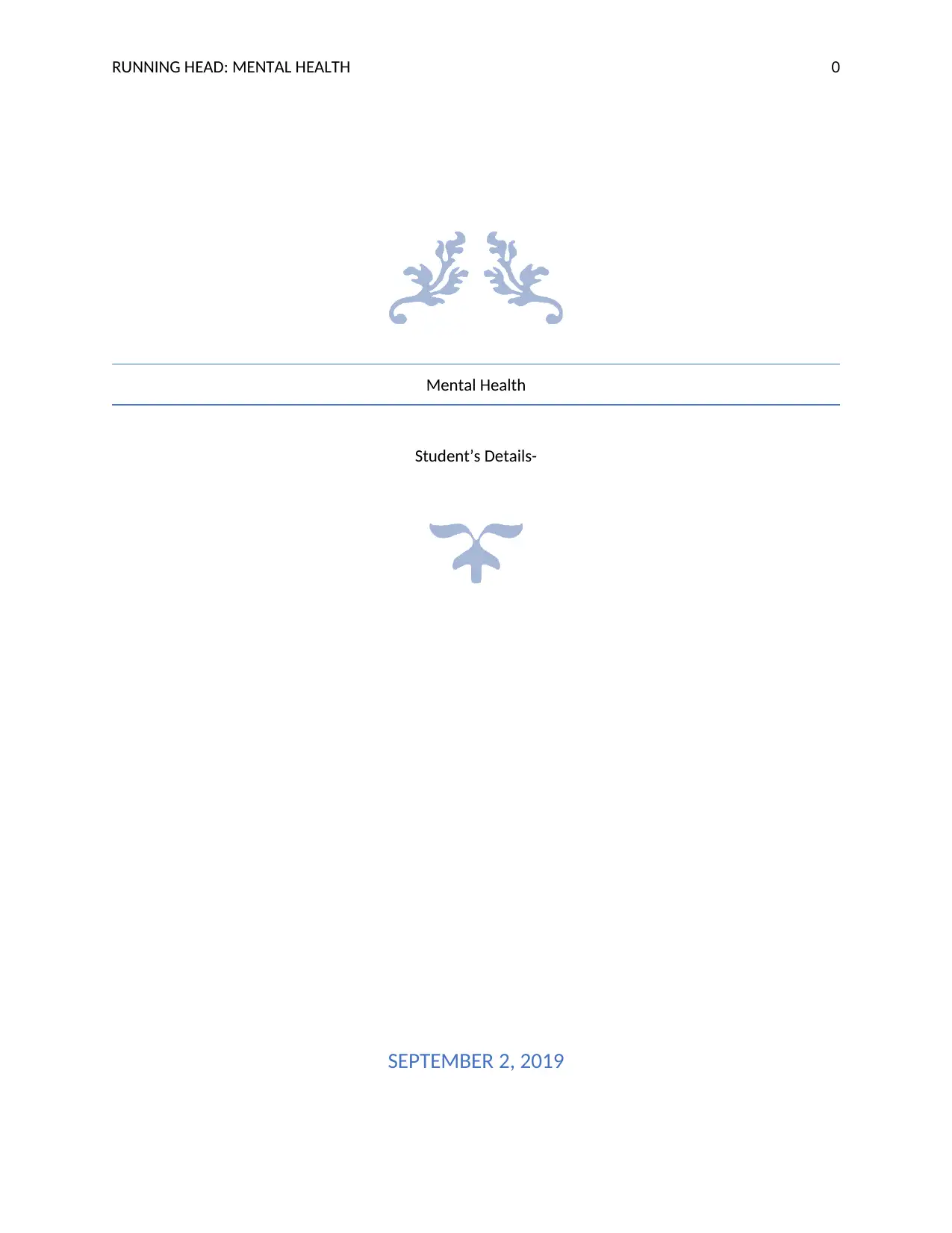
RUNNING HEAD: MENTAL HEALTH 0
Mental Health
Student’s Details-
SEPTEMBER 2, 2019
Mental Health
Student’s Details-
SEPTEMBER 2, 2019
Paraphrase This Document
Need a fresh take? Get an instant paraphrase of this document with our AI Paraphraser
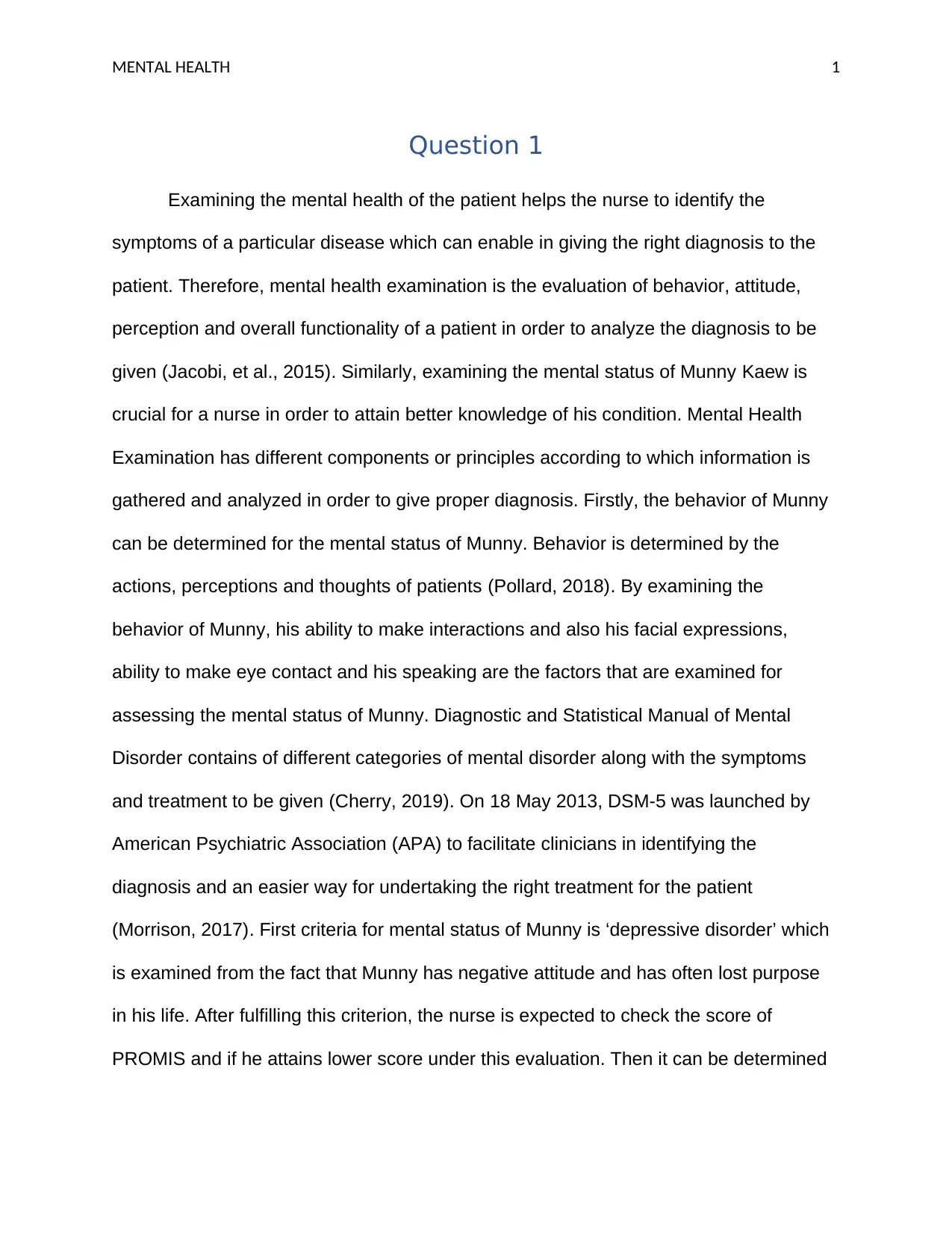
MENTAL HEALTH 1
Question 1
Examining the mental health of the patient helps the nurse to identify the
symptoms of a particular disease which can enable in giving the right diagnosis to the
patient. Therefore, mental health examination is the evaluation of behavior, attitude,
perception and overall functionality of a patient in order to analyze the diagnosis to be
given (Jacobi, et al., 2015). Similarly, examining the mental status of Munny Kaew is
crucial for a nurse in order to attain better knowledge of his condition. Mental Health
Examination has different components or principles according to which information is
gathered and analyzed in order to give proper diagnosis. Firstly, the behavior of Munny
can be determined for the mental status of Munny. Behavior is determined by the
actions, perceptions and thoughts of patients (Pollard, 2018). By examining the
behavior of Munny, his ability to make interactions and also his facial expressions,
ability to make eye contact and his speaking are the factors that are examined for
assessing the mental status of Munny. Diagnostic and Statistical Manual of Mental
Disorder contains of different categories of mental disorder along with the symptoms
and treatment to be given (Cherry, 2019). On 18 May 2013, DSM-5 was launched by
American Psychiatric Association (APA) to facilitate clinicians in identifying the
diagnosis and an easier way for undertaking the right treatment for the patient
(Morrison, 2017). First criteria for mental status of Munny is ‘depressive disorder’ which
is examined from the fact that Munny has negative attitude and has often lost purpose
in his life. After fulfilling this criterion, the nurse is expected to check the score of
PROMIS and if he attains lower score under this evaluation. Then it can be determined
Question 1
Examining the mental health of the patient helps the nurse to identify the
symptoms of a particular disease which can enable in giving the right diagnosis to the
patient. Therefore, mental health examination is the evaluation of behavior, attitude,
perception and overall functionality of a patient in order to analyze the diagnosis to be
given (Jacobi, et al., 2015). Similarly, examining the mental status of Munny Kaew is
crucial for a nurse in order to attain better knowledge of his condition. Mental Health
Examination has different components or principles according to which information is
gathered and analyzed in order to give proper diagnosis. Firstly, the behavior of Munny
can be determined for the mental status of Munny. Behavior is determined by the
actions, perceptions and thoughts of patients (Pollard, 2018). By examining the
behavior of Munny, his ability to make interactions and also his facial expressions,
ability to make eye contact and his speaking are the factors that are examined for
assessing the mental status of Munny. Diagnostic and Statistical Manual of Mental
Disorder contains of different categories of mental disorder along with the symptoms
and treatment to be given (Cherry, 2019). On 18 May 2013, DSM-5 was launched by
American Psychiatric Association (APA) to facilitate clinicians in identifying the
diagnosis and an easier way for undertaking the right treatment for the patient
(Morrison, 2017). First criteria for mental status of Munny is ‘depressive disorder’ which
is examined from the fact that Munny has negative attitude and has often lost purpose
in his life. After fulfilling this criterion, the nurse is expected to check the score of
PROMIS and if he attains lower score under this evaluation. Then it can be determined
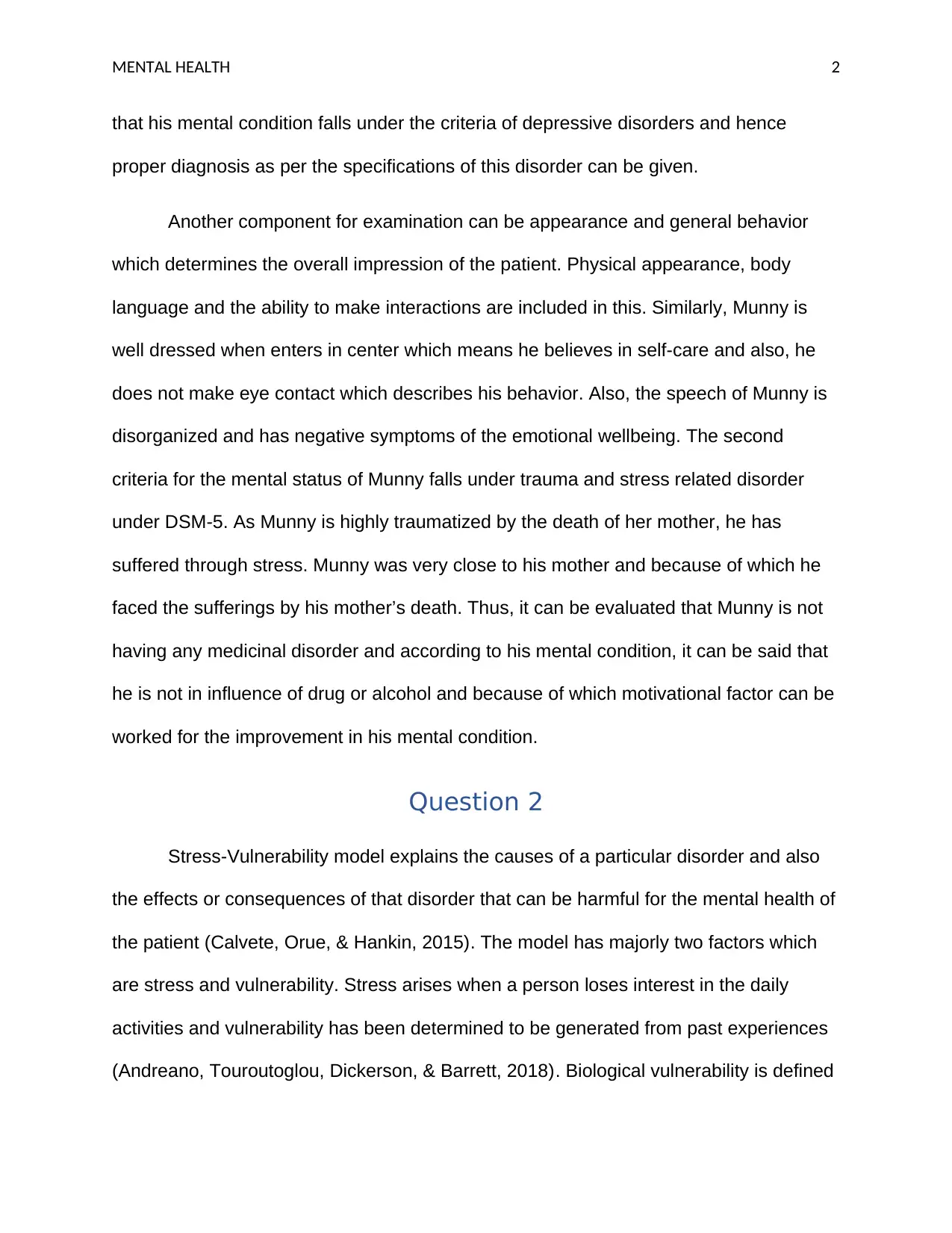
MENTAL HEALTH 2
that his mental condition falls under the criteria of depressive disorders and hence
proper diagnosis as per the specifications of this disorder can be given.
Another component for examination can be appearance and general behavior
which determines the overall impression of the patient. Physical appearance, body
language and the ability to make interactions are included in this. Similarly, Munny is
well dressed when enters in center which means he believes in self-care and also, he
does not make eye contact which describes his behavior. Also, the speech of Munny is
disorganized and has negative symptoms of the emotional wellbeing. The second
criteria for the mental status of Munny falls under trauma and stress related disorder
under DSM-5. As Munny is highly traumatized by the death of her mother, he has
suffered through stress. Munny was very close to his mother and because of which he
faced the sufferings by his mother’s death. Thus, it can be evaluated that Munny is not
having any medicinal disorder and according to his mental condition, it can be said that
he is not in influence of drug or alcohol and because of which motivational factor can be
worked for the improvement in his mental condition.
Question 2
Stress-Vulnerability model explains the causes of a particular disorder and also
the effects or consequences of that disorder that can be harmful for the mental health of
the patient (Calvete, Orue, & Hankin, 2015). The model has majorly two factors which
are stress and vulnerability. Stress arises when a person loses interest in the daily
activities and vulnerability has been determined to be generated from past experiences
(Andreano, Touroutoglou, Dickerson, & Barrett, 2018). Biological vulnerability is defined
that his mental condition falls under the criteria of depressive disorders and hence
proper diagnosis as per the specifications of this disorder can be given.
Another component for examination can be appearance and general behavior
which determines the overall impression of the patient. Physical appearance, body
language and the ability to make interactions are included in this. Similarly, Munny is
well dressed when enters in center which means he believes in self-care and also, he
does not make eye contact which describes his behavior. Also, the speech of Munny is
disorganized and has negative symptoms of the emotional wellbeing. The second
criteria for the mental status of Munny falls under trauma and stress related disorder
under DSM-5. As Munny is highly traumatized by the death of her mother, he has
suffered through stress. Munny was very close to his mother and because of which he
faced the sufferings by his mother’s death. Thus, it can be evaluated that Munny is not
having any medicinal disorder and according to his mental condition, it can be said that
he is not in influence of drug or alcohol and because of which motivational factor can be
worked for the improvement in his mental condition.
Question 2
Stress-Vulnerability model explains the causes of a particular disorder and also
the effects or consequences of that disorder that can be harmful for the mental health of
the patient (Calvete, Orue, & Hankin, 2015). The model has majorly two factors which
are stress and vulnerability. Stress arises when a person loses interest in the daily
activities and vulnerability has been determined to be generated from past experiences
(Andreano, Touroutoglou, Dickerson, & Barrett, 2018). Biological vulnerability is defined
⊘ This is a preview!⊘
Do you want full access?
Subscribe today to unlock all pages.

Trusted by 1+ million students worldwide
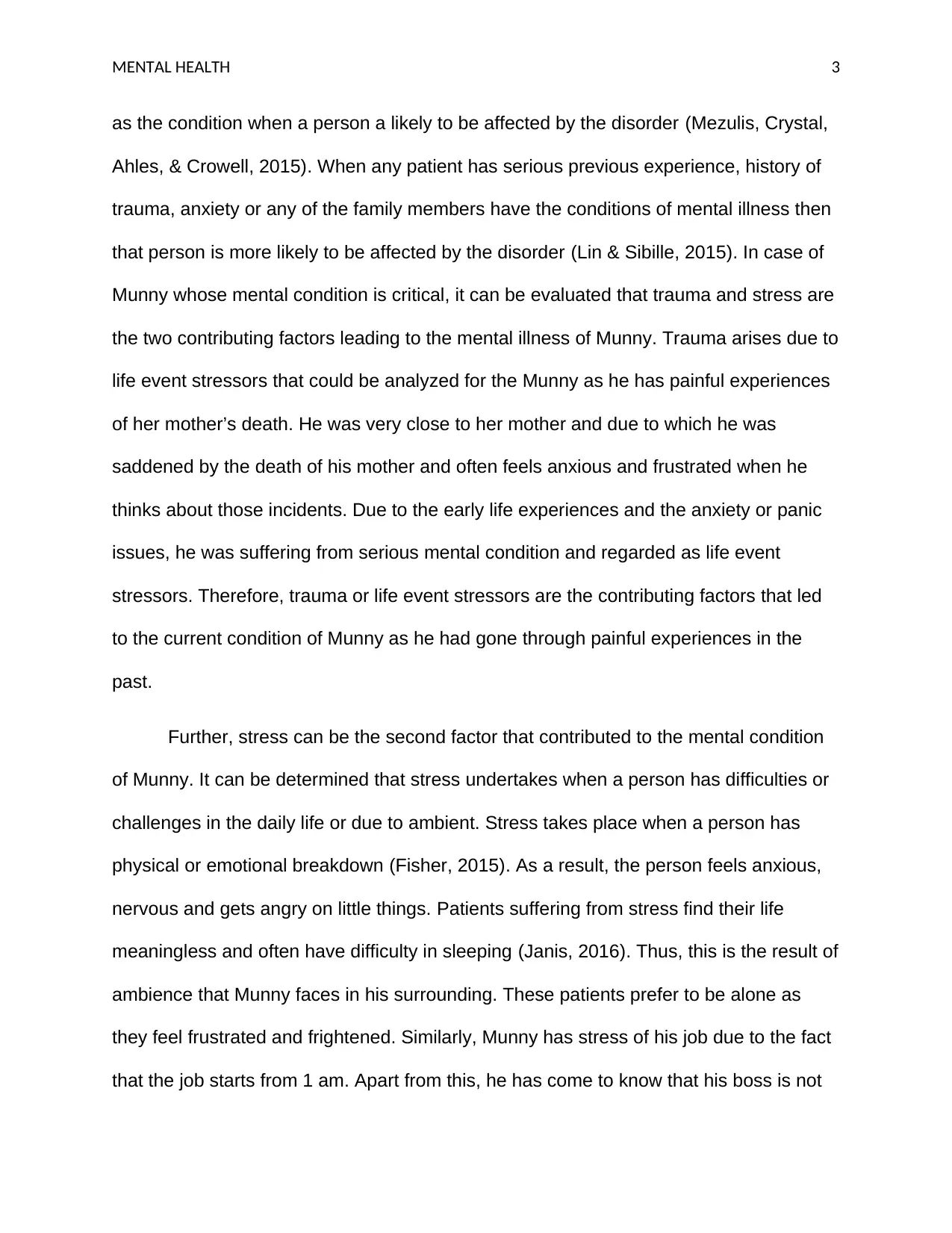
MENTAL HEALTH 3
as the condition when a person a likely to be affected by the disorder (Mezulis, Crystal,
Ahles, & Crowell, 2015). When any patient has serious previous experience, history of
trauma, anxiety or any of the family members have the conditions of mental illness then
that person is more likely to be affected by the disorder (Lin & Sibille, 2015). In case of
Munny whose mental condition is critical, it can be evaluated that trauma and stress are
the two contributing factors leading to the mental illness of Munny. Trauma arises due to
life event stressors that could be analyzed for the Munny as he has painful experiences
of her mother’s death. He was very close to her mother and due to which he was
saddened by the death of his mother and often feels anxious and frustrated when he
thinks about those incidents. Due to the early life experiences and the anxiety or panic
issues, he was suffering from serious mental condition and regarded as life event
stressors. Therefore, trauma or life event stressors are the contributing factors that led
to the current condition of Munny as he had gone through painful experiences in the
past.
Further, stress can be the second factor that contributed to the mental condition
of Munny. It can be determined that stress undertakes when a person has difficulties or
challenges in the daily life or due to ambient. Stress takes place when a person has
physical or emotional breakdown (Fisher, 2015). As a result, the person feels anxious,
nervous and gets angry on little things. Patients suffering from stress find their life
meaningless and often have difficulty in sleeping (Janis, 2016). Thus, this is the result of
ambience that Munny faces in his surrounding. These patients prefer to be alone as
they feel frustrated and frightened. Similarly, Munny has stress of his job due to the fact
that the job starts from 1 am. Apart from this, he has come to know that his boss is not
as the condition when a person a likely to be affected by the disorder (Mezulis, Crystal,
Ahles, & Crowell, 2015). When any patient has serious previous experience, history of
trauma, anxiety or any of the family members have the conditions of mental illness then
that person is more likely to be affected by the disorder (Lin & Sibille, 2015). In case of
Munny whose mental condition is critical, it can be evaluated that trauma and stress are
the two contributing factors leading to the mental illness of Munny. Trauma arises due to
life event stressors that could be analyzed for the Munny as he has painful experiences
of her mother’s death. He was very close to her mother and due to which he was
saddened by the death of his mother and often feels anxious and frustrated when he
thinks about those incidents. Due to the early life experiences and the anxiety or panic
issues, he was suffering from serious mental condition and regarded as life event
stressors. Therefore, trauma or life event stressors are the contributing factors that led
to the current condition of Munny as he had gone through painful experiences in the
past.
Further, stress can be the second factor that contributed to the mental condition
of Munny. It can be determined that stress undertakes when a person has difficulties or
challenges in the daily life or due to ambient. Stress takes place when a person has
physical or emotional breakdown (Fisher, 2015). As a result, the person feels anxious,
nervous and gets angry on little things. Patients suffering from stress find their life
meaningless and often have difficulty in sleeping (Janis, 2016). Thus, this is the result of
ambience that Munny faces in his surrounding. These patients prefer to be alone as
they feel frustrated and frightened. Similarly, Munny has stress of his job due to the fact
that the job starts from 1 am. Apart from this, he has come to know that his boss is not
Paraphrase This Document
Need a fresh take? Get an instant paraphrase of this document with our AI Paraphraser
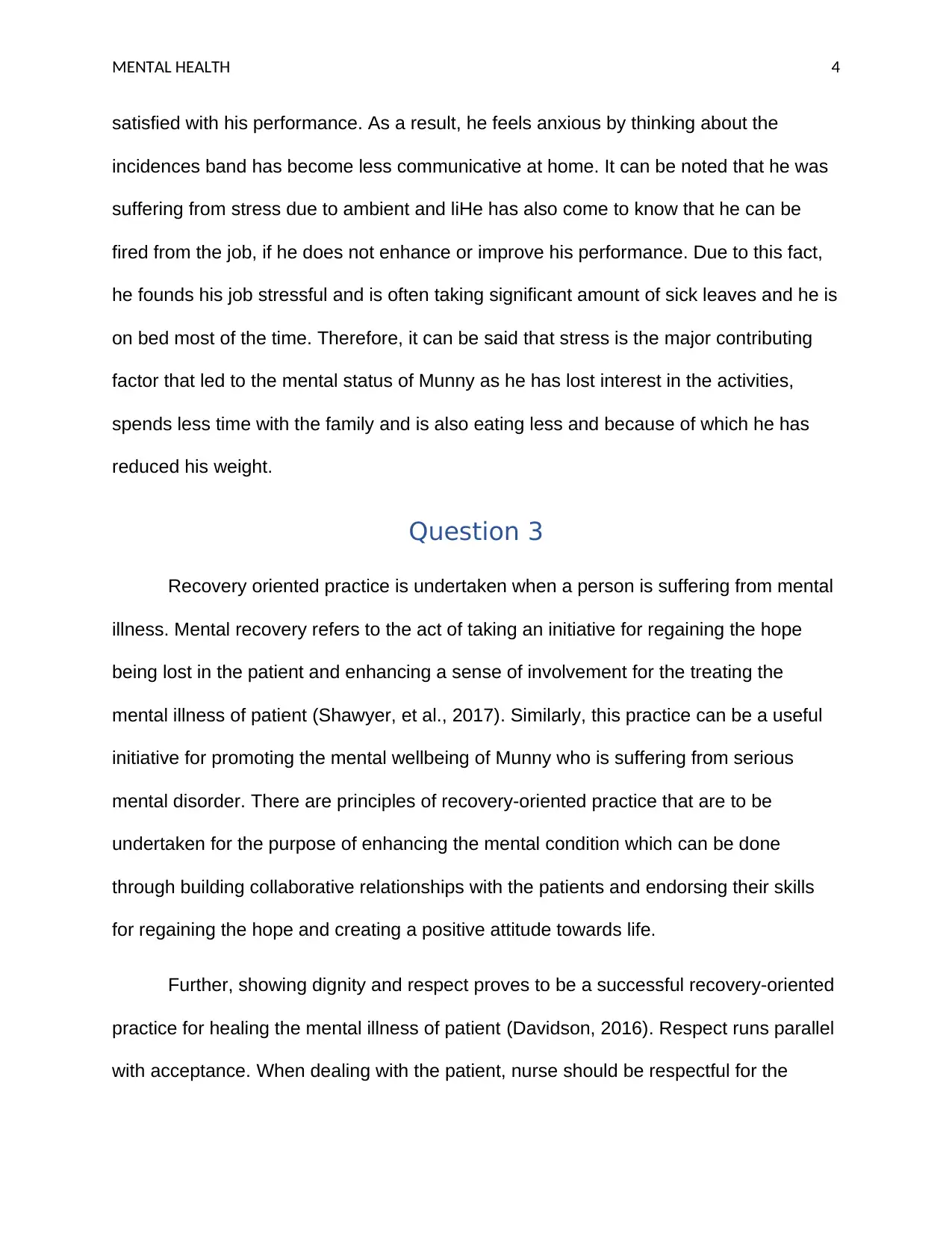
MENTAL HEALTH 4
satisfied with his performance. As a result, he feels anxious by thinking about the
incidences band has become less communicative at home. It can be noted that he was
suffering from stress due to ambient and liHe has also come to know that he can be
fired from the job, if he does not enhance or improve his performance. Due to this fact,
he founds his job stressful and is often taking significant amount of sick leaves and he is
on bed most of the time. Therefore, it can be said that stress is the major contributing
factor that led to the mental status of Munny as he has lost interest in the activities,
spends less time with the family and is also eating less and because of which he has
reduced his weight.
Question 3
Recovery oriented practice is undertaken when a person is suffering from mental
illness. Mental recovery refers to the act of taking an initiative for regaining the hope
being lost in the patient and enhancing a sense of involvement for the treating the
mental illness of patient (Shawyer, et al., 2017). Similarly, this practice can be a useful
initiative for promoting the mental wellbeing of Munny who is suffering from serious
mental disorder. There are principles of recovery-oriented practice that are to be
undertaken for the purpose of enhancing the mental condition which can be done
through building collaborative relationships with the patients and endorsing their skills
for regaining the hope and creating a positive attitude towards life.
Further, showing dignity and respect proves to be a successful recovery-oriented
practice for healing the mental illness of patient (Davidson, 2016). Respect runs parallel
with acceptance. When dealing with the patient, nurse should be respectful for the
satisfied with his performance. As a result, he feels anxious by thinking about the
incidences band has become less communicative at home. It can be noted that he was
suffering from stress due to ambient and liHe has also come to know that he can be
fired from the job, if he does not enhance or improve his performance. Due to this fact,
he founds his job stressful and is often taking significant amount of sick leaves and he is
on bed most of the time. Therefore, it can be said that stress is the major contributing
factor that led to the mental status of Munny as he has lost interest in the activities,
spends less time with the family and is also eating less and because of which he has
reduced his weight.
Question 3
Recovery oriented practice is undertaken when a person is suffering from mental
illness. Mental recovery refers to the act of taking an initiative for regaining the hope
being lost in the patient and enhancing a sense of involvement for the treating the
mental illness of patient (Shawyer, et al., 2017). Similarly, this practice can be a useful
initiative for promoting the mental wellbeing of Munny who is suffering from serious
mental disorder. There are principles of recovery-oriented practice that are to be
undertaken for the purpose of enhancing the mental condition which can be done
through building collaborative relationships with the patients and endorsing their skills
for regaining the hope and creating a positive attitude towards life.
Further, showing dignity and respect proves to be a successful recovery-oriented
practice for healing the mental illness of patient (Davidson, 2016). Respect runs parallel
with acceptance. When dealing with the patient, nurse should be respectful for the
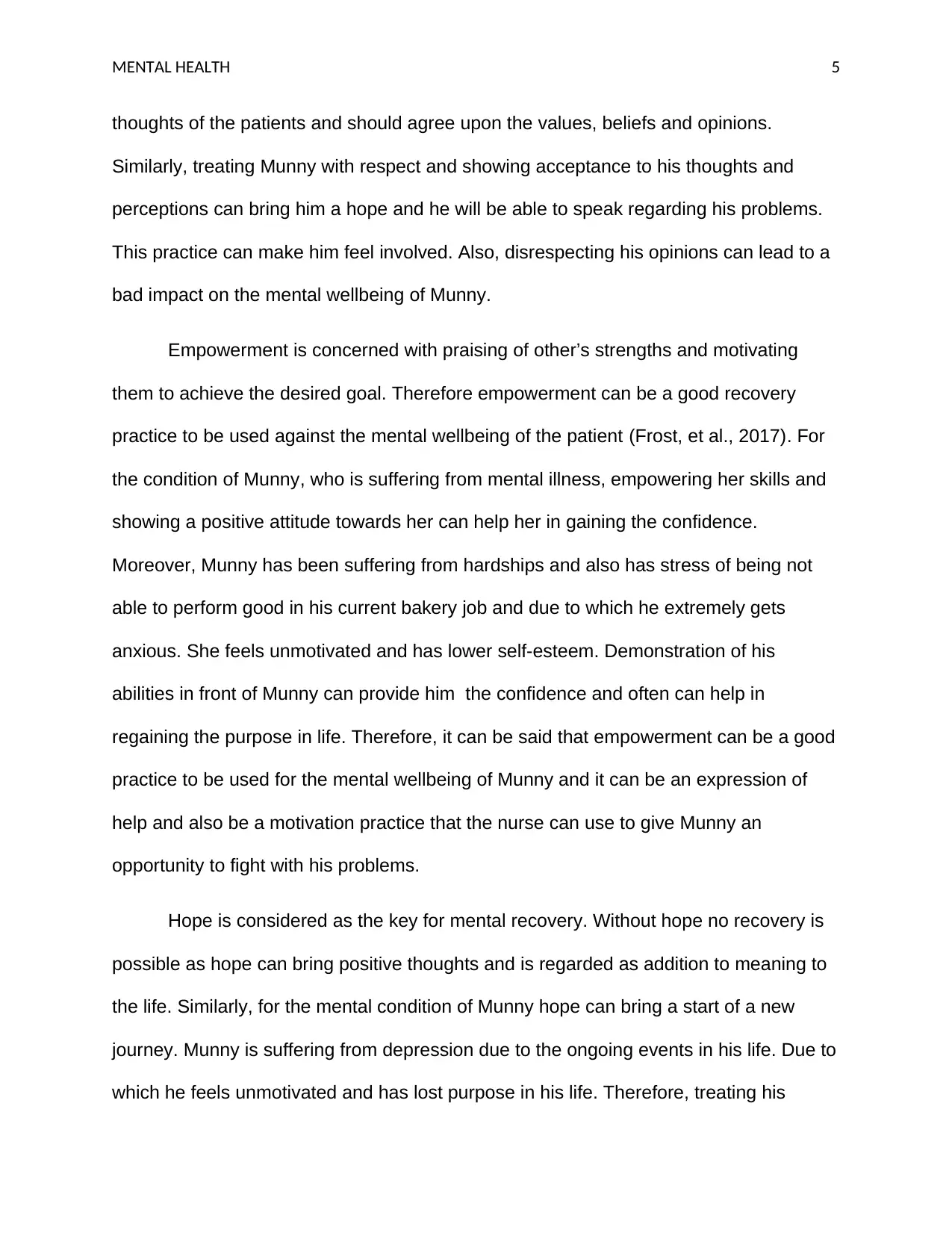
MENTAL HEALTH 5
thoughts of the patients and should agree upon the values, beliefs and opinions.
Similarly, treating Munny with respect and showing acceptance to his thoughts and
perceptions can bring him a hope and he will be able to speak regarding his problems.
This practice can make him feel involved. Also, disrespecting his opinions can lead to a
bad impact on the mental wellbeing of Munny.
Empowerment is concerned with praising of other’s strengths and motivating
them to achieve the desired goal. Therefore empowerment can be a good recovery
practice to be used against the mental wellbeing of the patient (Frost, et al., 2017). For
the condition of Munny, who is suffering from mental illness, empowering her skills and
showing a positive attitude towards her can help her in gaining the confidence.
Moreover, Munny has been suffering from hardships and also has stress of being not
able to perform good in his current bakery job and due to which he extremely gets
anxious. She feels unmotivated and has lower self-esteem. Demonstration of his
abilities in front of Munny can provide him the confidence and often can help in
regaining the purpose in life. Therefore, it can be said that empowerment can be a good
practice to be used for the mental wellbeing of Munny and it can be an expression of
help and also be a motivation practice that the nurse can use to give Munny an
opportunity to fight with his problems.
Hope is considered as the key for mental recovery. Without hope no recovery is
possible as hope can bring positive thoughts and is regarded as addition to meaning to
the life. Similarly, for the mental condition of Munny hope can bring a start of a new
journey. Munny is suffering from depression due to the ongoing events in his life. Due to
which he feels unmotivated and has lost purpose in his life. Therefore, treating his
thoughts of the patients and should agree upon the values, beliefs and opinions.
Similarly, treating Munny with respect and showing acceptance to his thoughts and
perceptions can bring him a hope and he will be able to speak regarding his problems.
This practice can make him feel involved. Also, disrespecting his opinions can lead to a
bad impact on the mental wellbeing of Munny.
Empowerment is concerned with praising of other’s strengths and motivating
them to achieve the desired goal. Therefore empowerment can be a good recovery
practice to be used against the mental wellbeing of the patient (Frost, et al., 2017). For
the condition of Munny, who is suffering from mental illness, empowering her skills and
showing a positive attitude towards her can help her in gaining the confidence.
Moreover, Munny has been suffering from hardships and also has stress of being not
able to perform good in his current bakery job and due to which he extremely gets
anxious. She feels unmotivated and has lower self-esteem. Demonstration of his
abilities in front of Munny can provide him the confidence and often can help in
regaining the purpose in life. Therefore, it can be said that empowerment can be a good
practice to be used for the mental wellbeing of Munny and it can be an expression of
help and also be a motivation practice that the nurse can use to give Munny an
opportunity to fight with his problems.
Hope is considered as the key for mental recovery. Without hope no recovery is
possible as hope can bring positive thoughts and is regarded as addition to meaning to
the life. Similarly, for the mental condition of Munny hope can bring a start of a new
journey. Munny is suffering from depression due to the ongoing events in his life. Due to
which he feels unmotivated and has lost purpose in his life. Therefore, treating his
⊘ This is a preview!⊘
Do you want full access?
Subscribe today to unlock all pages.

Trusted by 1+ million students worldwide
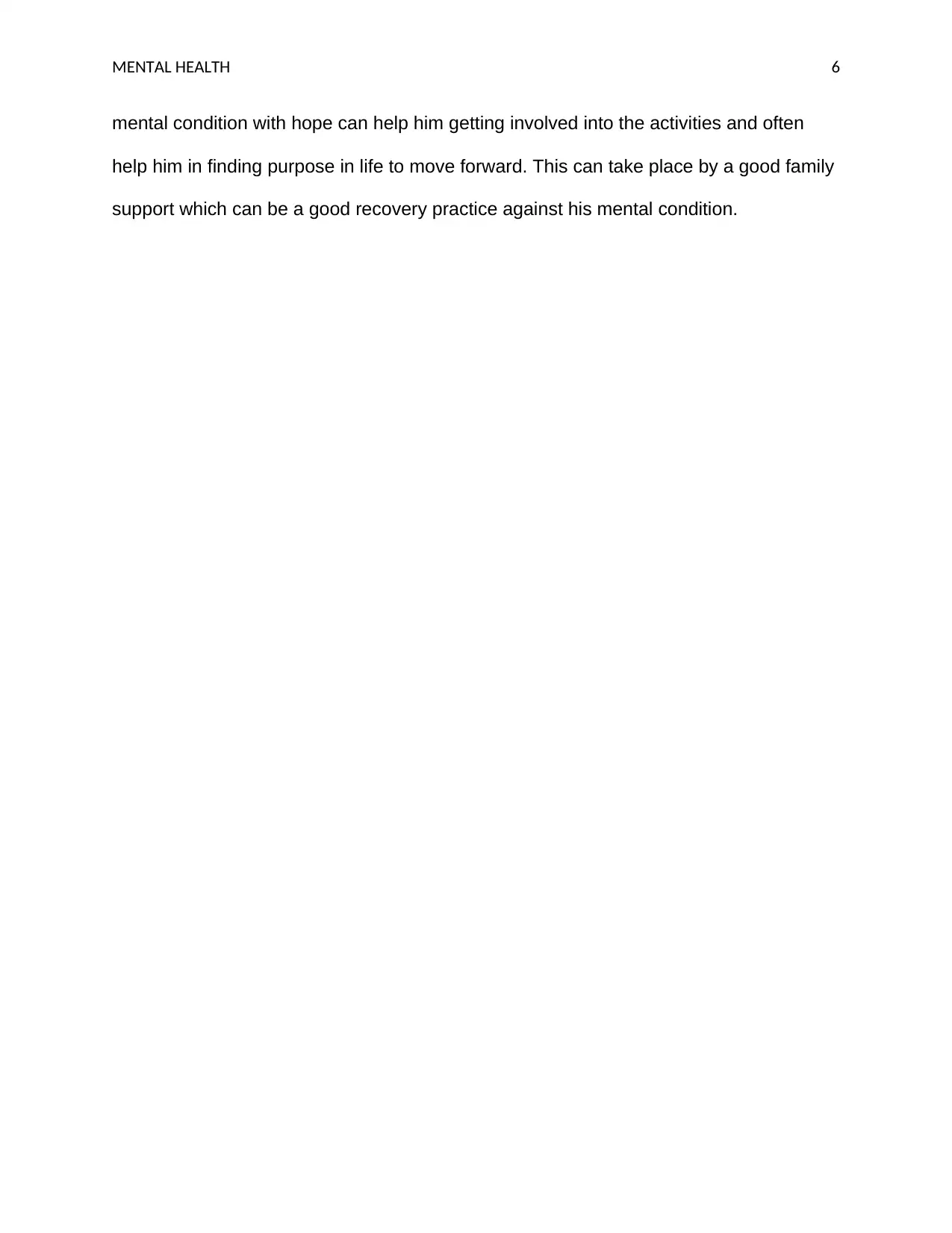
MENTAL HEALTH 6
mental condition with hope can help him getting involved into the activities and often
help him in finding purpose in life to move forward. This can take place by a good family
support which can be a good recovery practice against his mental condition.
mental condition with hope can help him getting involved into the activities and often
help him in finding purpose in life to move forward. This can take place by a good family
support which can be a good recovery practice against his mental condition.
Paraphrase This Document
Need a fresh take? Get an instant paraphrase of this document with our AI Paraphraser
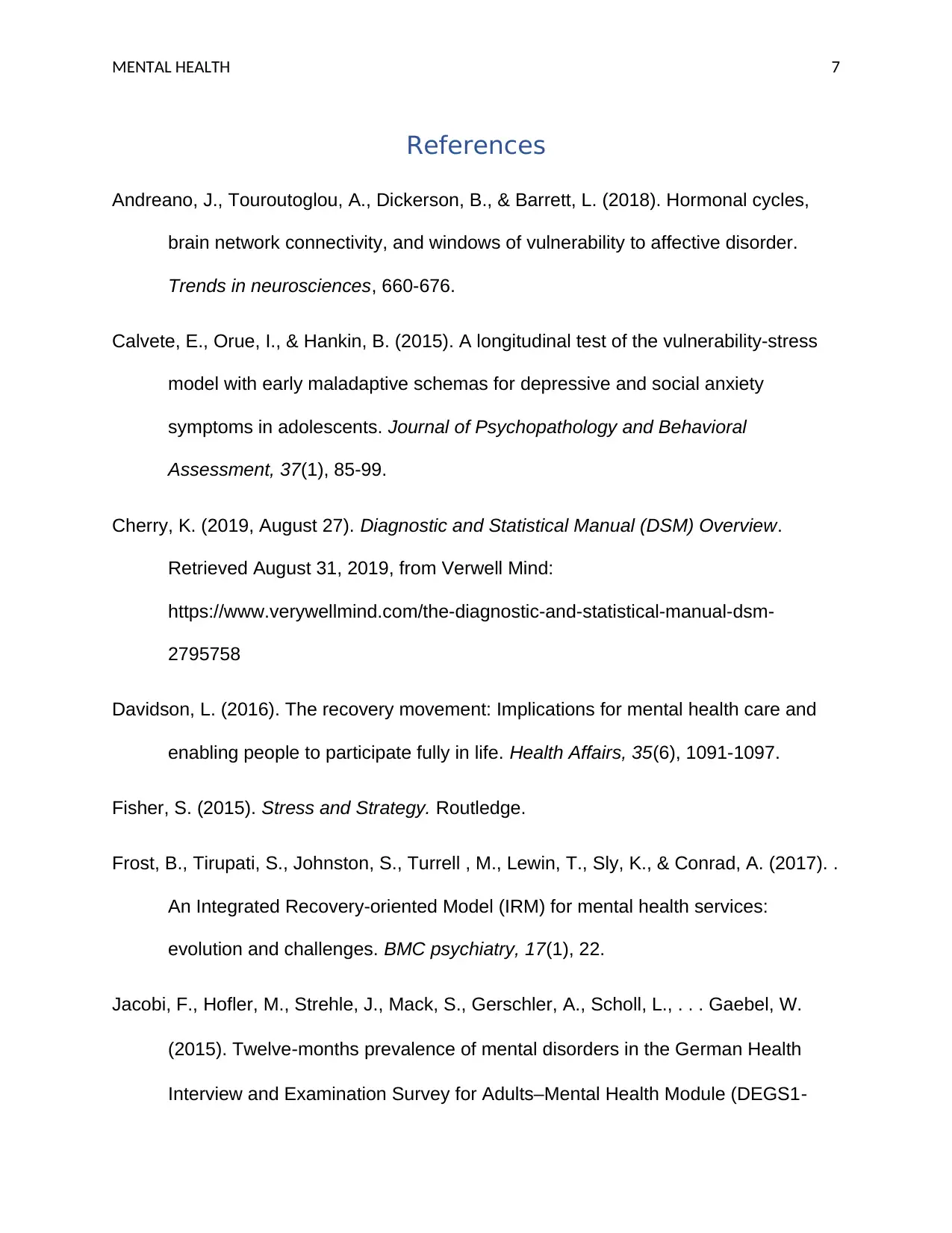
MENTAL HEALTH 7
References
Andreano, J., Touroutoglou, A., Dickerson, B., & Barrett, L. (2018). Hormonal cycles,
brain network connectivity, and windows of vulnerability to affective disorder.
Trends in neurosciences, 660-676.
Calvete, E., Orue, I., & Hankin, B. (2015). A longitudinal test of the vulnerability-stress
model with early maladaptive schemas for depressive and social anxiety
symptoms in adolescents. Journal of Psychopathology and Behavioral
Assessment, 37(1), 85-99.
Cherry, K. (2019, August 27). Diagnostic and Statistical Manual (DSM) Overview.
Retrieved August 31, 2019, from Verwell Mind:
https://www.verywellmind.com/the-diagnostic-and-statistical-manual-dsm-
2795758
Davidson, L. (2016). The recovery movement: Implications for mental health care and
enabling people to participate fully in life. Health Affairs, 35(6), 1091-1097.
Fisher, S. (2015). Stress and Strategy. Routledge.
Frost, B., Tirupati, S., Johnston, S., Turrell , M., Lewin, T., Sly, K., & Conrad, A. (2017). .
An Integrated Recovery-oriented Model (IRM) for mental health services:
evolution and challenges. BMC psychiatry, 17(1), 22.
Jacobi, F., Hofler, M., Strehle, J., Mack, S., Gerschler, A., Scholl, L., . . . Gaebel, W.
(2015). Twelve‐months prevalence of mental disorders in the German Health
Interview and Examination Survey for Adults–Mental Health Module (DEGS1‐
References
Andreano, J., Touroutoglou, A., Dickerson, B., & Barrett, L. (2018). Hormonal cycles,
brain network connectivity, and windows of vulnerability to affective disorder.
Trends in neurosciences, 660-676.
Calvete, E., Orue, I., & Hankin, B. (2015). A longitudinal test of the vulnerability-stress
model with early maladaptive schemas for depressive and social anxiety
symptoms in adolescents. Journal of Psychopathology and Behavioral
Assessment, 37(1), 85-99.
Cherry, K. (2019, August 27). Diagnostic and Statistical Manual (DSM) Overview.
Retrieved August 31, 2019, from Verwell Mind:
https://www.verywellmind.com/the-diagnostic-and-statistical-manual-dsm-
2795758
Davidson, L. (2016). The recovery movement: Implications for mental health care and
enabling people to participate fully in life. Health Affairs, 35(6), 1091-1097.
Fisher, S. (2015). Stress and Strategy. Routledge.
Frost, B., Tirupati, S., Johnston, S., Turrell , M., Lewin, T., Sly, K., & Conrad, A. (2017). .
An Integrated Recovery-oriented Model (IRM) for mental health services:
evolution and challenges. BMC psychiatry, 17(1), 22.
Jacobi, F., Hofler, M., Strehle, J., Mack, S., Gerschler, A., Scholl, L., . . . Gaebel, W.
(2015). Twelve‐months prevalence of mental disorders in the German Health
Interview and Examination Survey for Adults–Mental Health Module (DEGS1‐
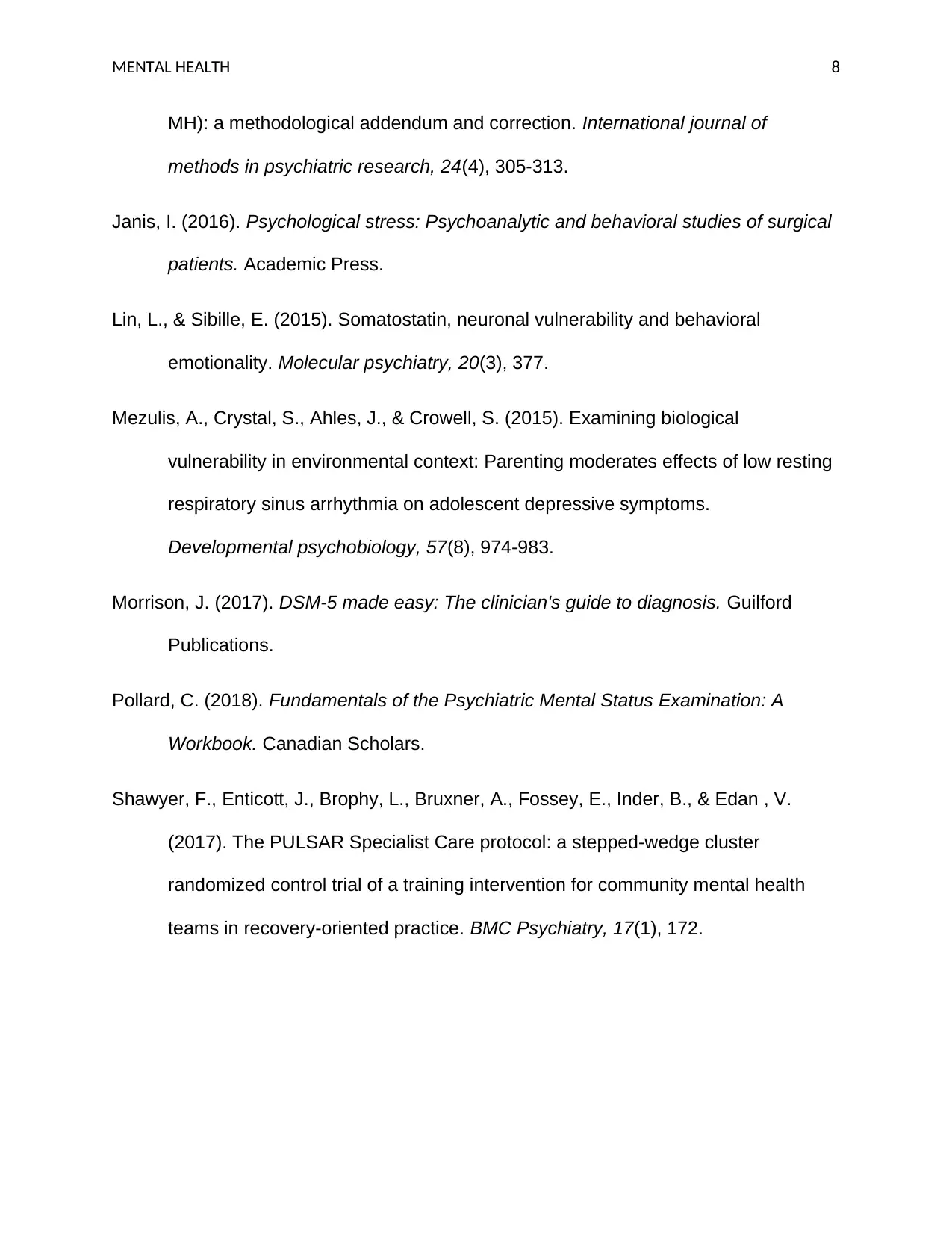
MENTAL HEALTH 8
MH): a methodological addendum and correction. International journal of
methods in psychiatric research, 24(4), 305-313.
Janis, I. (2016). Psychological stress: Psychoanalytic and behavioral studies of surgical
patients. Academic Press.
Lin, L., & Sibille, E. (2015). Somatostatin, neuronal vulnerability and behavioral
emotionality. Molecular psychiatry, 20(3), 377.
Mezulis, A., Crystal, S., Ahles, J., & Crowell, S. (2015). Examining biological
vulnerability in environmental context: Parenting moderates effects of low resting
respiratory sinus arrhythmia on adolescent depressive symptoms.
Developmental psychobiology, 57(8), 974-983.
Morrison, J. (2017). DSM-5 made easy: The clinician's guide to diagnosis. Guilford
Publications.
Pollard, C. (2018). Fundamentals of the Psychiatric Mental Status Examination: A
Workbook. Canadian Scholars.
Shawyer, F., Enticott, J., Brophy, L., Bruxner, A., Fossey, E., Inder, B., & Edan , V.
(2017). The PULSAR Specialist Care protocol: a stepped-wedge cluster
randomized control trial of a training intervention for community mental health
teams in recovery-oriented practice. BMC Psychiatry, 17(1), 172.
MH): a methodological addendum and correction. International journal of
methods in psychiatric research, 24(4), 305-313.
Janis, I. (2016). Psychological stress: Psychoanalytic and behavioral studies of surgical
patients. Academic Press.
Lin, L., & Sibille, E. (2015). Somatostatin, neuronal vulnerability and behavioral
emotionality. Molecular psychiatry, 20(3), 377.
Mezulis, A., Crystal, S., Ahles, J., & Crowell, S. (2015). Examining biological
vulnerability in environmental context: Parenting moderates effects of low resting
respiratory sinus arrhythmia on adolescent depressive symptoms.
Developmental psychobiology, 57(8), 974-983.
Morrison, J. (2017). DSM-5 made easy: The clinician's guide to diagnosis. Guilford
Publications.
Pollard, C. (2018). Fundamentals of the Psychiatric Mental Status Examination: A
Workbook. Canadian Scholars.
Shawyer, F., Enticott, J., Brophy, L., Bruxner, A., Fossey, E., Inder, B., & Edan , V.
(2017). The PULSAR Specialist Care protocol: a stepped-wedge cluster
randomized control trial of a training intervention for community mental health
teams in recovery-oriented practice. BMC Psychiatry, 17(1), 172.
⊘ This is a preview!⊘
Do you want full access?
Subscribe today to unlock all pages.

Trusted by 1+ million students worldwide
1 out of 9
Related Documents
Your All-in-One AI-Powered Toolkit for Academic Success.
+13062052269
info@desklib.com
Available 24*7 on WhatsApp / Email
![[object Object]](/_next/static/media/star-bottom.7253800d.svg)
Unlock your academic potential
Copyright © 2020–2026 A2Z Services. All Rights Reserved. Developed and managed by ZUCOL.





![Mental Health and Wellbeing Report: [University Name], Semester 1](/_next/image/?url=https%3A%2F%2Fdesklib.com%2Fmedia%2Fimages%2Fob%2F76a73dbed3364ee18fbd23baba0664de.jpg&w=256&q=75)